人教版(Go for it)七年级下册Unit 4 Don't eat in class. 单元复习(共22张PPT)
文档属性
| 名称 | 人教版(Go for it)七年级下册Unit 4 Don't eat in class. 单元复习(共22张PPT) |  | |
| 格式 | pptx | ||
| 文件大小 | 342.3KB | ||
| 资源类型 | 教案 | ||
| 版本资源 | 人教新目标(Go for it)版 | ||
| 科目 | 英语 | ||
| 更新时间 | 2023-03-17 16:38:13 | ||
图片预览

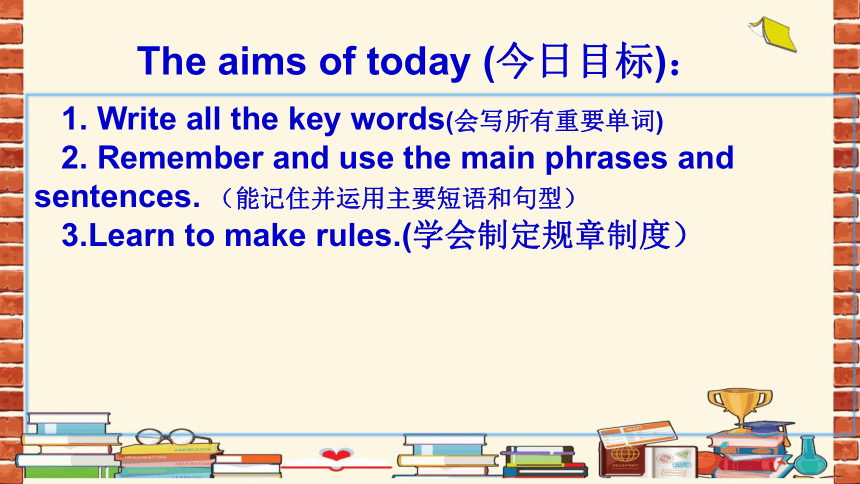
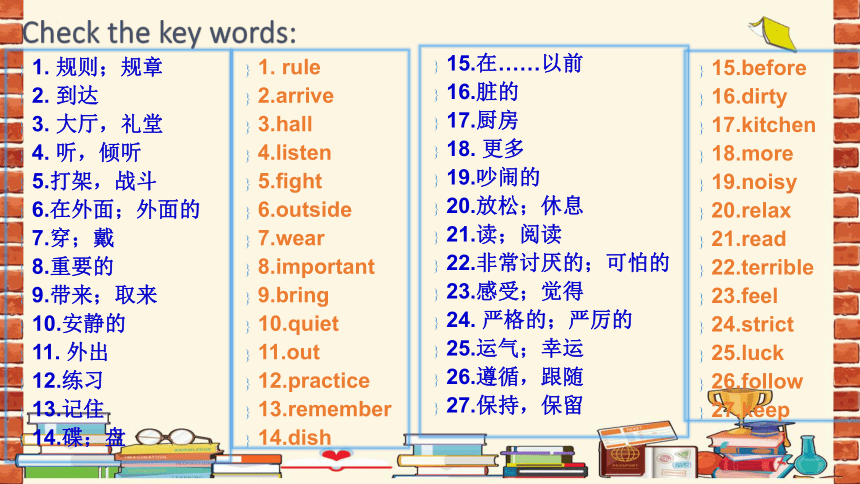
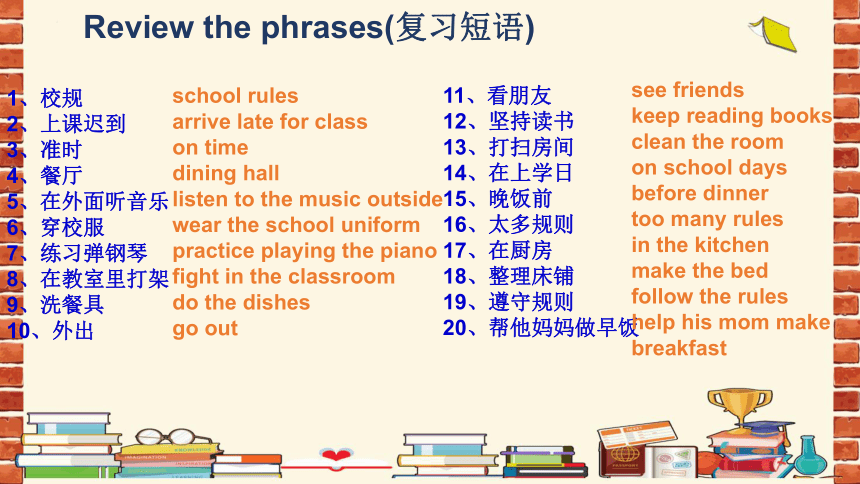
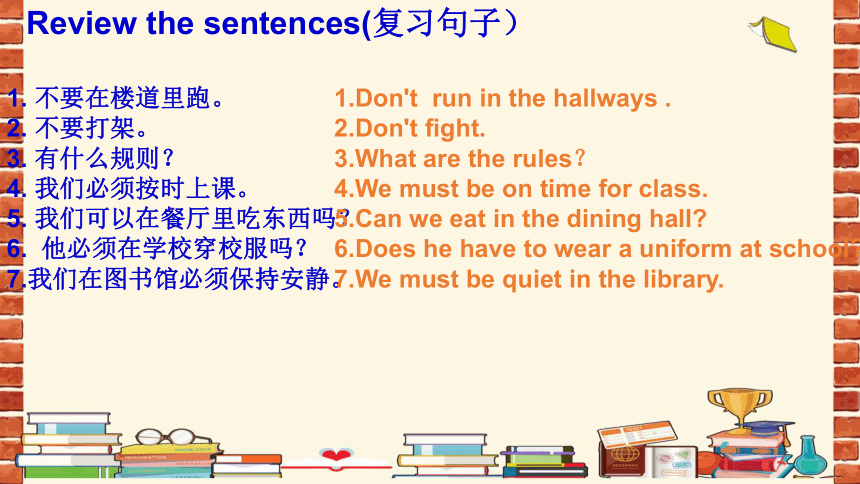
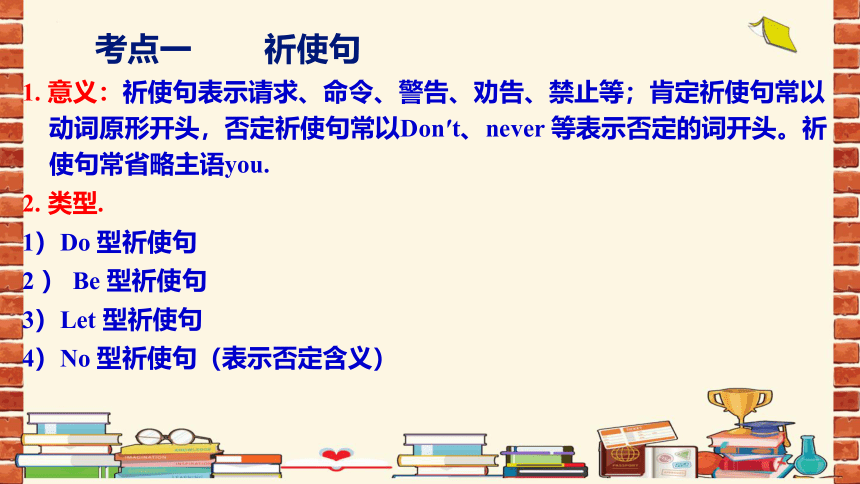

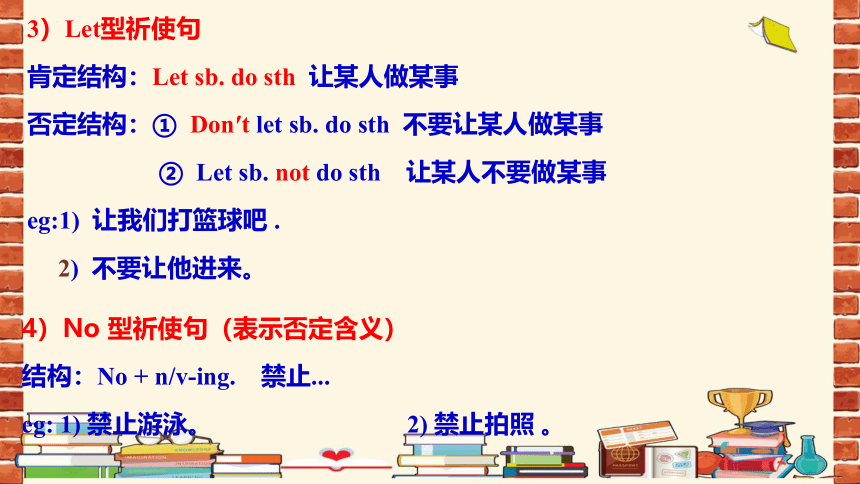
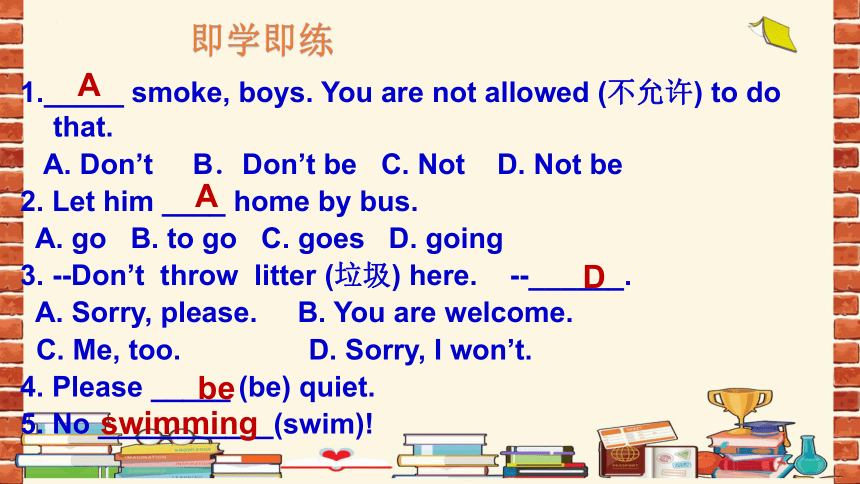
文档简介
(共22张PPT)
空白演示
单击输入您的封面副标题
Review of Unit 4
(四单元复习)
The aims of today (今日目标):
1. Write all the key words(会写所有重要单词)
2. Remember and use the main phrases and sentences. (能记住并运用主要短语和句型)
3.Learn to make rules.(学会制定规章制度)
Check the key words:
1. 规则;规章
2. 到达
3. 大厅,礼堂
4. 听,倾听
5.打架,战斗
6.在外面;外面的
7.穿;戴
8.重要的
9.带来;取来
10.安静的
11. 外出
12.练习
13.记住
14.碟;盘
15.在……以前
16.脏的
17.厨房
18. 更多
19.吵闹的
20.放松;休息
21.读;阅读
22.非常讨厌的;可怕的
23.感受;觉得
24. 严格的;严厉的
25.运气;幸运
26.遵循,跟随
27.保持,保留
1. rule
2.arrive
3.hall
4.listen
5.fight
6.outside
7.wear
8.important
9.bring
10.quiet
11.out
12.practice
13.remember
14.dish
15.before
16.dirty
17.kitchen
18.more
19.noisy
20.relax
21.read
22.terrible
23.feel
24.strict
25.luck
26.follow
27.keep
Review the phrases(复习短语)
1、校规
2、上课迟到
3、准时
4、餐厅
5、在外面听音乐
6、穿校服
7、练习弹钢琴
8、在教室里打架
9、洗餐具
10、外出
school rules
arrive late for class
on time
dining hall
listen to the music outside
wear the school uniform
practice playing the piano
fight in the classroom
do the dishes
go out
11、看朋友
12、坚持读书
13、打扫房间
14、在上学日
15、晚饭前
16、太多规则
17、在厨房
18、整理床铺
19、遵守规则
20、帮他妈妈做早饭
see friends
keep reading books
clean the room
on school days
before dinner
too many rules
in the kitchen
make the bed
follow the rules
help his mom make
breakfast
Review the sentences(复习句子)
1. 不要在楼道里跑。
2. 不要打架。
3. 有什么规则?
4. 我们必须按时上课。
5. 我们可以在餐厅里吃东西吗?
6. 他必须在学校穿校服吗?
7.我们在图书馆必须保持安静。
1.Don't run in the hallways .
2.Don't fight.
3.What are the rules?
4.We must be on time for class.
5.Can we eat in the dining hall
6.Does he have to wear a uniform at school
7.We must be quiet in the library.
考点一 祈使句
1. 意义:祈使句表示请求、命令、警告、劝告、禁止等;肯定祈使句常以动词原形开头,否定祈使句常以Don′t、never 等表示否定的词开头。祈使句常省略主语you.
2. 类型.
1)Do 型祈使句
2 ) Be 型祈使句
3)Let 型祈使句
4)No 型祈使句(表示否定含义)
2、类型
1)Do 型祈使句
肯定结构:动词原形+其他
否定结构:Don′t +动词原形+其他=You mustn’t + 动词原形+其他
不许.../禁止...
eg: 1) 请给我一本书。
2)不要在走廊里跑。
2)Be型祈使句
肯定结构:Be+形容词+其他
否定结构:Don′t + be +形容词+其他
eg:1) 安静点。
2)上课不要迟到。
3)Let型祈使句
肯定结构:Let sb. do sth 让某人做某事
否定结构:① Don′t let sb. do sth 不要让某人做某事
② Let sb. not do sth 让某人不要做某事
eg:1) 让我们打篮球吧 .
2) 不要让他进来。
4)No 型祈使句(表示否定含义)
结构:No + n/v-ing. 禁止...
eg: 1) 禁止游泳。 2) 禁止拍照 。
即学即练
1._____ smoke, boys. You are not allowed (不允许) to do that.
A. Don’t B.Don’t be C. Not D. Not be
2. Let him ____ home by bus.
A. go B. to go C. goes D. going
3. --Don’t throw litter (垃圾) here. --______.
A. Sorry, please. B. You are welcome.
C. Me, too. D. Sorry, I won’t.
4. Please _____ (be) quiet.
5. No ___________(swim)!
A
A
D
be
swimming
have to 和must的用法
1.共同点:
1) I must go now.
2) He has to walk to school.
二者均可表示 “必须”,其后都加 ____________
考点二、
动词原形
2.不同点
1)have to 表示客观上 “必须或不得不”要做的事;有人称、单复数和时态的变化。
其单三形式为:has to
肯定句:主语+have/has to + 动词原形+其他
eg: 汤姆不得不写作业。
否定句:主语+don't/doesn't have to +动词原形+其他 不必...
eg:你不必早到校。
一般疑问句:--Do/Does +主语+have to +动词原形+其他?
肯定回答:Yes, 主语+do/does. 否定回答: No,主语+don't/doesn't.
eg:--他不得不穿校服吗? --是的,他必须。/ 不,他不必。
Does he have to wear a uniform Yes,he does. /
No, he doesn’t .
2)must表示主观意愿,“必须”,无人称、单复数和时态变化;主要用于肯定句和疑问句,其否定形式mustn't 表示 “禁止”。
肯定句:主语 + must + 动词原形+其他
eg: 我/你/他必须努力学习。
一般疑问句:--Must+主语 + 动词原形+其他?
肯定回答:--Yes,主语+must.
否定回答:-- No,主语+needn't/don't/doesn't have to.
eg:--我必须在九点睡觉吗?
-是的,你必须。 / 不,你不必。
即学即练
1.Do you have to ______ (wear) school uniforms
2. Tony ______ _________ ( not have) to go to school today.
3.I _____ ( have) to read English every morning.
4. Don’t run in the hallways! We must _____ the school rules.
A. follow B. take C. bring D. write
5. Mary has to help her mother with cooking。(改为一般疑问句)
_____ Mary ____ _____ help with cooking
A
Does
have to
wear
doesn’t have
have
考点三 in class 和 in the class 区别
Don’t listen to music in class. 课上不要听音乐。
in class 意为“在课上”。
in the class加了定冠词 the 意为“在班上”。
eg: 课堂上不要说话 。 Don’t talk __________.
不要在班上跑。 Don’t run____________.
in the class
in class
考点四 too many / too much /much too 的用法
I am not happy because there are too many rules at home.
1.There are ______ ____ people in the park.
2.I have _____ ________ homework.
3.It’s ______ _______ cold today.
4.Don’t eat ______ _______.
可数名词复数
不可数名词
adj/adv
too much
much too
too much
too many
总结:too many+ _______________ 太多...
too much + ___________ 太多...
much too + _________ 太...
考点五 bring (v.) 带来 反义词: take 带走
1)bring sb. sth= bring sth to sb. 给某人带来某物
2) bring sb./sth. to sp 把某人/某物带到某处
eg: 1.请帮我拿一杯水.(同义句)
Please bring me a glass of water.=
2.我们可以带音乐播放器来学校吗
Can we ______ the tape play _____ school
bring
to
考点六 strict (adj)严格的/严厉的
我妈妈对我要求很严格,对我的学习要求也很严格。
My mother is strict _____me, and she is strict ____ my study, too.
总结:对某人要求严格
对某事要求严格
with
in
be strict with sb.
be strict in sth.
remember sb. / sth.
remember to do sth.
remember doing sth.
1)你记得我吗?Do you remember ______
2) 请记得打扫你的房间。Remember ___ ____ your room.
3) 我记得在北京见过他。I remember ____ ______ in Beijing.
me
to clean
meeting him
考点七、 remember (v) .记住/记起 反义词:forget 忘记
总结: 记得某人 / 某事
记得去做某事(还没做)
记得做过某事(已做)
注意:forget与remember用法是一样的哦!
①作动词 keep doing sth 持续做某事(无间断)
keep sb doing sth 使某人坚持做某事
keep sb/sth + adj 使某人/某物...
②作系动词 keep + adj 保持...
keep healthy = be in good health保持健康
keep quiet 保持安静
eg: Tom坚持每天阅读。Tom keeps _________ every day.
我爸爸让我坚持每天跑步.
My father keeps me _________ every day.
你应该留短发。
You should (应该)keep your hair _______.
reading
running
short
考点八、keep 保持,保留
Test in class
1.You can’t listen to music in ___class. A. the B.a C.an D./
2.Can you watch TV____school nights A. at B. on C.in D./
3.Don’t talk ______eat in class. A.And B. or C. so D. but
4.Do you have lots of ______to follow in your school
A. friends B. questions C. rules D. dreams
5.I’m unhappy. He has ______ questions to ask me.
A. too much B. too many C. much too D. many too
6.Her bike is broken. She ____ walk to school.
A. have to B. has to C. has D. is
7.A lot of good teachers ____ their students.
A. are strict with B. is strict in
C. are strict in D. is strict with
D
B
B
C
B
B
A
(当 堂 检 测)
用所给单词的适当形式填空
1. Can we ________ (wear) hats in school
2. ___________ (not be) late. It’s your first day to school.
3. There _______(be) a lot of books on the desk.
4. You must remember _________ (clean) the classroom.
5. You don’t like singing songs.
I don’t like it, __________(too).
6.“Please be quiet. No_________ (talk)!” says our teacher.
7.Can you help me _______(make) dumplings
8.You must _______ (be) more careful next time.
9.The boss (老板) always keeps these workers_________
(work) over 8 hours a day.
wear
Don't be
are
to clean
either
talking
make
be
working
1.巩固今天所复习的知识
2.写自己的班规或者家规
Homework
空白演示
单击输入您的封面副标题
Review of Unit 4
(四单元复习)
The aims of today (今日目标):
1. Write all the key words(会写所有重要单词)
2. Remember and use the main phrases and sentences. (能记住并运用主要短语和句型)
3.Learn to make rules.(学会制定规章制度)
Check the key words:
1. 规则;规章
2. 到达
3. 大厅,礼堂
4. 听,倾听
5.打架,战斗
6.在外面;外面的
7.穿;戴
8.重要的
9.带来;取来
10.安静的
11. 外出
12.练习
13.记住
14.碟;盘
15.在……以前
16.脏的
17.厨房
18. 更多
19.吵闹的
20.放松;休息
21.读;阅读
22.非常讨厌的;可怕的
23.感受;觉得
24. 严格的;严厉的
25.运气;幸运
26.遵循,跟随
27.保持,保留
1. rule
2.arrive
3.hall
4.listen
5.fight
6.outside
7.wear
8.important
9.bring
10.quiet
11.out
12.practice
13.remember
14.dish
15.before
16.dirty
17.kitchen
18.more
19.noisy
20.relax
21.read
22.terrible
23.feel
24.strict
25.luck
26.follow
27.keep
Review the phrases(复习短语)
1、校规
2、上课迟到
3、准时
4、餐厅
5、在外面听音乐
6、穿校服
7、练习弹钢琴
8、在教室里打架
9、洗餐具
10、外出
school rules
arrive late for class
on time
dining hall
listen to the music outside
wear the school uniform
practice playing the piano
fight in the classroom
do the dishes
go out
11、看朋友
12、坚持读书
13、打扫房间
14、在上学日
15、晚饭前
16、太多规则
17、在厨房
18、整理床铺
19、遵守规则
20、帮他妈妈做早饭
see friends
keep reading books
clean the room
on school days
before dinner
too many rules
in the kitchen
make the bed
follow the rules
help his mom make
breakfast
Review the sentences(复习句子)
1. 不要在楼道里跑。
2. 不要打架。
3. 有什么规则?
4. 我们必须按时上课。
5. 我们可以在餐厅里吃东西吗?
6. 他必须在学校穿校服吗?
7.我们在图书馆必须保持安静。
1.Don't run in the hallways .
2.Don't fight.
3.What are the rules?
4.We must be on time for class.
5.Can we eat in the dining hall
6.Does he have to wear a uniform at school
7.We must be quiet in the library.
考点一 祈使句
1. 意义:祈使句表示请求、命令、警告、劝告、禁止等;肯定祈使句常以动词原形开头,否定祈使句常以Don′t、never 等表示否定的词开头。祈使句常省略主语you.
2. 类型.
1)Do 型祈使句
2 ) Be 型祈使句
3)Let 型祈使句
4)No 型祈使句(表示否定含义)
2、类型
1)Do 型祈使句
肯定结构:动词原形+其他
否定结构:Don′t +动词原形+其他=You mustn’t + 动词原形+其他
不许.../禁止...
eg: 1) 请给我一本书。
2)不要在走廊里跑。
2)Be型祈使句
肯定结构:Be+形容词+其他
否定结构:Don′t + be +形容词+其他
eg:1) 安静点。
2)上课不要迟到。
3)Let型祈使句
肯定结构:Let sb. do sth 让某人做某事
否定结构:① Don′t let sb. do sth 不要让某人做某事
② Let sb. not do sth 让某人不要做某事
eg:1) 让我们打篮球吧 .
2) 不要让他进来。
4)No 型祈使句(表示否定含义)
结构:No + n/v-ing. 禁止...
eg: 1) 禁止游泳。 2) 禁止拍照 。
即学即练
1._____ smoke, boys. You are not allowed (不允许) to do that.
A. Don’t B.Don’t be C. Not D. Not be
2. Let him ____ home by bus.
A. go B. to go C. goes D. going
3. --Don’t throw litter (垃圾) here. --______.
A. Sorry, please. B. You are welcome.
C. Me, too. D. Sorry, I won’t.
4. Please _____ (be) quiet.
5. No ___________(swim)!
A
A
D
be
swimming
have to 和must的用法
1.共同点:
1) I must go now.
2) He has to walk to school.
二者均可表示 “必须”,其后都加 ____________
考点二、
动词原形
2.不同点
1)have to 表示客观上 “必须或不得不”要做的事;有人称、单复数和时态的变化。
其单三形式为:has to
肯定句:主语+have/has to + 动词原形+其他
eg: 汤姆不得不写作业。
否定句:主语+don't/doesn't have to +动词原形+其他 不必...
eg:你不必早到校。
一般疑问句:--Do/Does +主语+have to +动词原形+其他?
肯定回答:Yes, 主语+do/does. 否定回答: No,主语+don't/doesn't.
eg:--他不得不穿校服吗? --是的,他必须。/ 不,他不必。
Does he have to wear a uniform Yes,he does. /
No, he doesn’t .
2)must表示主观意愿,“必须”,无人称、单复数和时态变化;主要用于肯定句和疑问句,其否定形式mustn't 表示 “禁止”。
肯定句:主语 + must + 动词原形+其他
eg: 我/你/他必须努力学习。
一般疑问句:--Must+主语 + 动词原形+其他?
肯定回答:--Yes,主语+must.
否定回答:-- No,主语+needn't/don't/doesn't have to.
eg:--我必须在九点睡觉吗?
-是的,你必须。 / 不,你不必。
即学即练
1.Do you have to ______ (wear) school uniforms
2. Tony ______ _________ ( not have) to go to school today.
3.I _____ ( have) to read English every morning.
4. Don’t run in the hallways! We must _____ the school rules.
A. follow B. take C. bring D. write
5. Mary has to help her mother with cooking。(改为一般疑问句)
_____ Mary ____ _____ help with cooking
A
Does
have to
wear
doesn’t have
have
考点三 in class 和 in the class 区别
Don’t listen to music in class. 课上不要听音乐。
in class 意为“在课上”。
in the class加了定冠词 the 意为“在班上”。
eg: 课堂上不要说话 。 Don’t talk __________.
不要在班上跑。 Don’t run____________.
in the class
in class
考点四 too many / too much /much too 的用法
I am not happy because there are too many rules at home.
1.There are ______ ____ people in the park.
2.I have _____ ________ homework.
3.It’s ______ _______ cold today.
4.Don’t eat ______ _______.
可数名词复数
不可数名词
adj/adv
too much
much too
too much
too many
总结:too many+ _______________ 太多...
too much + ___________ 太多...
much too + _________ 太...
考点五 bring (v.) 带来 反义词: take 带走
1)bring sb. sth= bring sth to sb. 给某人带来某物
2) bring sb./sth. to sp 把某人/某物带到某处
eg: 1.请帮我拿一杯水.(同义句)
Please bring me a glass of water.=
2.我们可以带音乐播放器来学校吗
Can we ______ the tape play _____ school
bring
to
考点六 strict (adj)严格的/严厉的
我妈妈对我要求很严格,对我的学习要求也很严格。
My mother is strict _____me, and she is strict ____ my study, too.
总结:对某人要求严格
对某事要求严格
with
in
be strict with sb.
be strict in sth.
remember sb. / sth.
remember to do sth.
remember doing sth.
1)你记得我吗?Do you remember ______
2) 请记得打扫你的房间。Remember ___ ____ your room.
3) 我记得在北京见过他。I remember ____ ______ in Beijing.
me
to clean
meeting him
考点七、 remember (v) .记住/记起 反义词:forget 忘记
总结: 记得某人 / 某事
记得去做某事(还没做)
记得做过某事(已做)
注意:forget与remember用法是一样的哦!
①作动词 keep doing sth 持续做某事(无间断)
keep sb doing sth 使某人坚持做某事
keep sb/sth + adj 使某人/某物...
②作系动词 keep + adj 保持...
keep healthy = be in good health保持健康
keep quiet 保持安静
eg: Tom坚持每天阅读。Tom keeps _________ every day.
我爸爸让我坚持每天跑步.
My father keeps me _________ every day.
你应该留短发。
You should (应该)keep your hair _______.
reading
running
short
考点八、keep 保持,保留
Test in class
1.You can’t listen to music in ___class. A. the B.a C.an D./
2.Can you watch TV____school nights A. at B. on C.in D./
3.Don’t talk ______eat in class. A.And B. or C. so D. but
4.Do you have lots of ______to follow in your school
A. friends B. questions C. rules D. dreams
5.I’m unhappy. He has ______ questions to ask me.
A. too much B. too many C. much too D. many too
6.Her bike is broken. She ____ walk to school.
A. have to B. has to C. has D. is
7.A lot of good teachers ____ their students.
A. are strict with B. is strict in
C. are strict in D. is strict with
D
B
B
C
B
B
A
(当 堂 检 测)
用所给单词的适当形式填空
1. Can we ________ (wear) hats in school
2. ___________ (not be) late. It’s your first day to school.
3. There _______(be) a lot of books on the desk.
4. You must remember _________ (clean) the classroom.
5. You don’t like singing songs.
I don’t like it, __________(too).
6.“Please be quiet. No_________ (talk)!” says our teacher.
7.Can you help me _______(make) dumplings
8.You must _______ (be) more careful next time.
9.The boss (老板) always keeps these workers_________
(work) over 8 hours a day.
wear
Don't be
are
to clean
either
talking
make
be
working
1.巩固今天所复习的知识
2.写自己的班规或者家规
Homework
同课章节目录
- Unit 1 Can you play the guitar?
- Section A
- Section B
- Unit 2 What time do you go to school?
- Section A
- Section B
- Unit 3 How do you get to school?
- Section A
- Section B
- Unit 4 Don't eat in class.
- Section A
- Section B
- Unit 5 Why do you like pandas?
- Section A
- Section B
- Unit 6 I'm watching TV.
- Section A
- Section B
- Review of Units 1-6
- Unit 7 It's raining!
- Section A
- Section B
- Unit 8 Is there a post office near here?
- Section A
- Section B
- Unit 9 What does he look like?
- Section A
- Section B
- Unit 10 I'd like some noodles.
- Section A
- Section B
- Unit 11 How was your school trip?
- Section A
- Section B
- Unit 12 What did you do last weekend?
- Section A
- Section B
